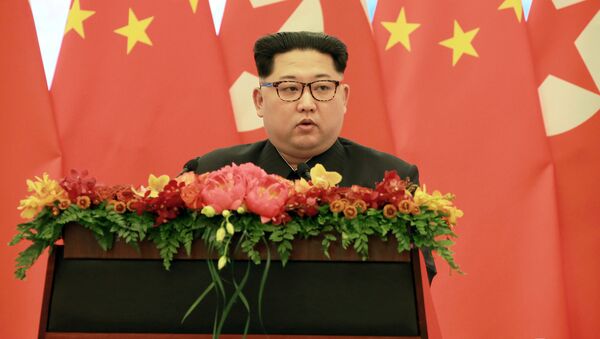US media coverage of the warming relations between South Korea and the Democratic People's Republic of Korea (DPRK) in the north has been overwhelmingly negative, and the closer the Friday meeting between South Korean president Moon Jae In and North Korean leader Kim Jong Un draws, the more alarmist it grows. The New York Times this week has warned of Kim's "fearsome nuclear stockpile" as he walks to the negotiating table, and of China's supposed ire at being left out of negotiations.
"I think there's a fear that the South Koreans could drift into the Chinese orbit and out of the US orbit," Gowans said.
"[The US is] afraid that the South Koreans, if they meet and talk with the North Koreans, will conclude or are concluding that the problem is not the North Koreans; the problem is the United States," Gowans, author of "Washington's Long War on Syria," told Loud & Clear. "And they'll seek to conclude a deal with the North Koreans, which from the South Korean perspective will be beneficial because it will lift the threat of war, so they hope."
— Alex Rubinstein (@RealAlexRubi) April 24, 2018
"The South Koreans may agree to what the United States doesn't want and the US media doesn't want under any circumstances and that's the withdrawal of US troops from the peninsula," Gowans said.
Gowans suggests that the process itself raises questions that the powers that be don't want asked. "If we talk about a peace treaty, then you also have to talk about the question of why there's a US military presence on the Korean Peninsula," Gowans continued. "If you have peace between North and South, why do you need a US military presence?"
Gowans told Radio Sputnik that the media likely sees the talks as having been manipulated by Kim, while in reality, "the North Koreans were pushing Washington, or had been for at least a year, to have some kind of summit, some kind of talk, and Washington pushed back and said ‘no,' they're not interested because they're pursuing… this coercive policy of forcing the North Koreans to surrender."
— Alex Rubinstein (@RealAlexRubi) January 4, 2018
Now that Kim has made peace overtures to Seoul, the southern half of the peninsula might see them as the beginning of a path out of the constant threat of war. "So I think looking at this from Washington's perspective, one of their strategic errors was creating fear in South Korea," Gowans said.
While US media frequently characterizes Kim as reckless and crazy, Gowans said that it is actually the US strategy that is erratic and unproductive. "Certainly the North Korean strategy isn't a rogue or irrational one. Even Washington will now acknowledge that the North Koreans have been ‘cooly rational,' as they put it. But the policy of forcing the North Koreans to surrender is certainly out of sync and doesn't seem to be a particularly effective one; this is one that the United States has been pursuing since 1948 and it hasn't succeeded," Gowans said.




